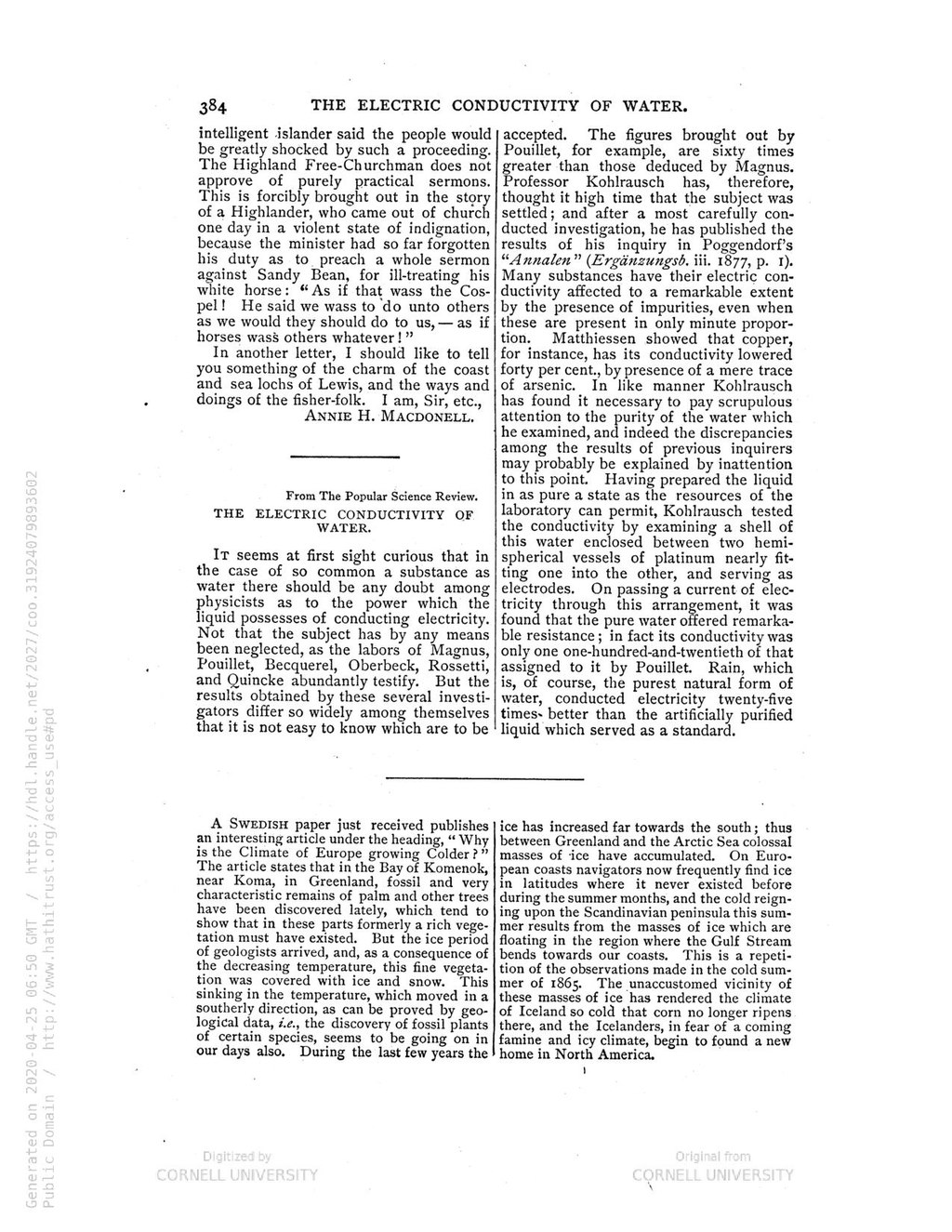intelligent islander said the people would be greatly shocked by such a proceeding. The Highland Free-Churchman does not approve of purely practical sermons. This is forcibly brought out in the story of a Highlander, who came out of church one day in a violent state of indignation, because the minister had so far forgotten his duty as to preach a whole sermon against Sandy Bean, for ill-treating his white horse: "As if that wass the Cospel! He said we wass to do unto others as we would they should do to us, — as if horses wass others whatever!"
In another letter, I should like to tell you something of the charm of the coast and sea lochs of Lewis, and the ways and doings of the fisher-folk. I am, Sir, etc., Annie H. Macdonell.
THE ELECTRIC CONDUCTIVITY OF WATER.
It seems at first sight curious that in the case of so common a substance as water there should be any doubt among physicists as to the power which the liquid possesses of conducting electricity. Not that the subject has by any means been neglected, as the labors of Magnus, Pouillet, Becquerel, Oberbeck, Rossetti, and Quincke abundantly testify. But the results obtained by these several investigators differ so widely among themselves that it is not easy to know which are to be accepted. The figures brought out by Pouillet, for example, are sixty times greater than those deduced by Magnus. Professor Kohlrausch has, therefore, thought it high time that the subject was settled; and after a most carefully conducted investigation, he has published the results of his inquiry in Poggendorf's "Annalen" (Ergänzungsb. iii. 1877, p. 1). Many substances have their electric conductivity affected to a remarkable extent by the presence of impurities, even when these are present in only minute proportion. Matthiessen showed that copper, for instance, has its conductivity lowered forty per cent., by presence of a mere trace of arsenic. In like manner Kohlrausch has found it necessary to pay scrupulous attention to the purity of the water which he examined, and indeed the discrepancies among the results of previous inquirers may probably be explained by inattention to this point. Having prepared the liquid in as pure a state as the resources of the laboratory can permit, Kohlrausch tested the conductivity by examining a shell of this water enclosed between two hemispherical vessels of platinum nearly fitting one into the other, and serving as electrodes. On passing a current of electricity through this arrangement, it was found that the pure water offered remarkable resistance; in fact its conductivity was only one one-hundred-and-twentieth of that assigned to it by Pouillet. Rain, which is, of course, the purest natural form of water, conducted electricity twenty-five times better than the artificially purified liquid which served as a standard.
A Swedish paper just received publishes an interesting article under the heading, "Why is the Climate of Europe growing Colder?" The article states that in the Bay of Komenok, near Koma, in Greenland, fossil and very characteristic remains of palm and other trees have been discovered lately, which tend to show that in these parts formerly a rich vegetation must have existed. But the ice period of geologists arrived, and, as a consequence of the decreasing temperature, this fine vegetation was covered with ice and snow. This sinking in the temperature, which moved in a southerly direction, as can be proved by geological data, i.e., the discovery of fossil plants of certain species, seems to be going on in our days also. During the last few years the ice has increased far towards the south; thus between Greenland and the Arctic Sea colossal masses of ice have accumulated. On European coasts navigators now frequently find ice in latitudes where it never existed before during the summer months, and the cold reigning upon the Scandinavian peninsula this summer results from the masses of ice which are floating in the region where the Gulf Stream bends towards our coasts. This is a repetition of the observations made in the cold summer of 1865. The unaccustomed vicinity of these masses of ice has rendered the climate of Iceland so cold that corn no longer ripens there, and the Icelanders, in fear of a coming famine and icy climate, begin to found a new home in North America.
